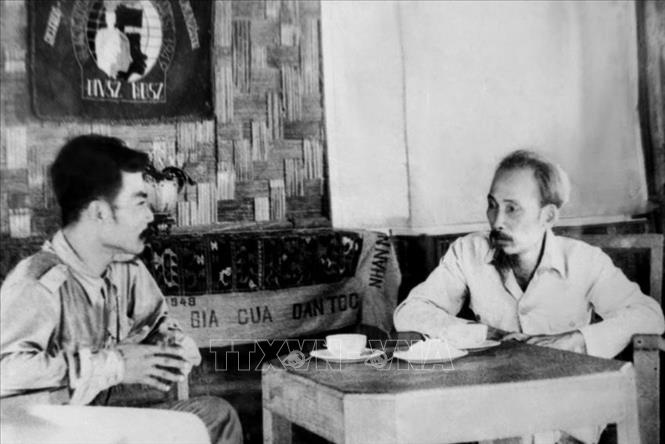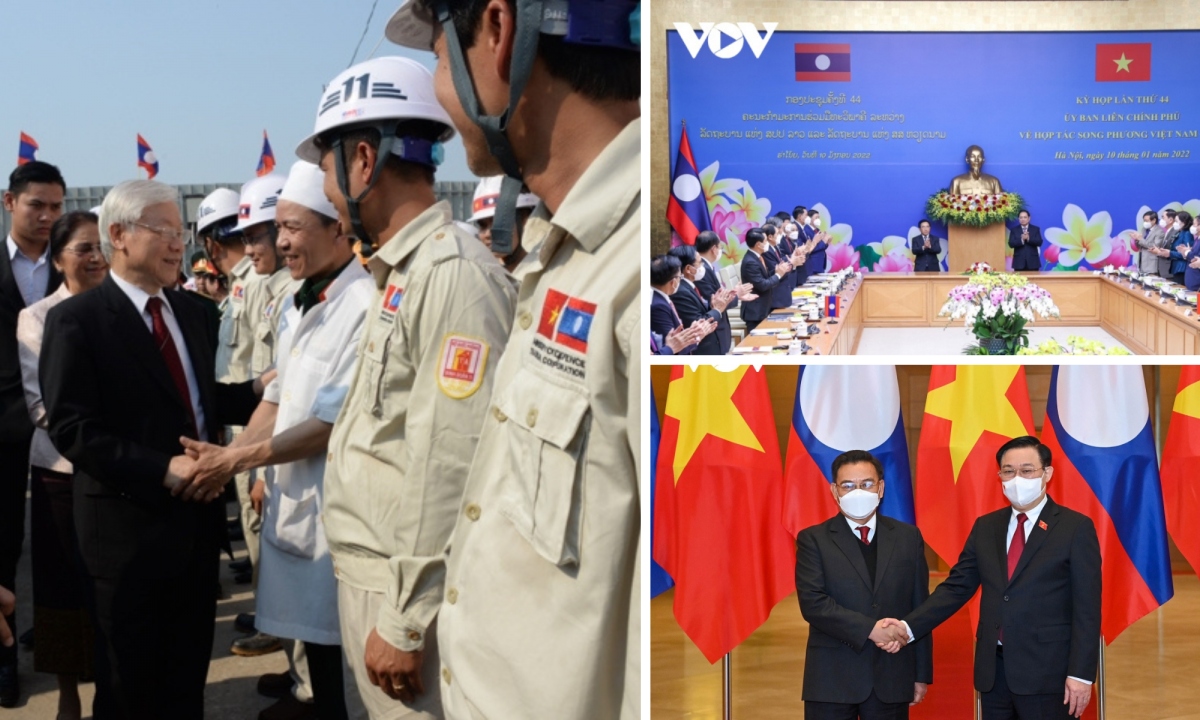60 years of Vietnam – Laos relationship: the story written with faith and love
A decade has passed since Dr. Nguyen Manh Hung took on the role as Vietnamese Ambassador to Laos, the memories of the co-operation relationship remain fresh in the mind of the diplomat.
Vietnam is No.1 in the heart of Lao people

Ambassador Hung recalls that he was initially appointed Vietnamese Ambassador to Laos in December 2012, a year which coincided with the 50th anniversary of the establishment of diplomatic ties between the two countries. It was also a year of special solidarity, similar to how this year the Parties, States, and people of Vietnam and Laos are celebrating 60 years of bilateral diplomacy.
“Two days after President Ho Chi Minh read the Declaration of Independence at Ba Dinh Square, proclaiming the birth of the Democratic Republic of Vietnam, now the Socialist Republic of Vietnam, President Ho on September 4, 1945 invited Lao Prince Souphanouvong to visit Vietnam for talks about relations between the two countries. The two sides agreed to join the common fight for national liberation and against foreign invaders. That was the first official meeting between the leaders of the two countries, laying the foundation for the special solidarity relationship between Vietnam and Laos,” recalls Ambassador Hung.
During his lifetime, President Ho always valued solidarity and mutual assistance in the struggle for the cause of national liberation of both Vietnam and Laos. He maintained that, “assisting Laos means assisting Vietnam,” and “the victory of Laotian people is also that of Vietnamese people.”
So far Vietnam has poured approximately US$5.1 billion into 209 investment projects throughout Laos, ranking first among 78 countries and territories that receive Vietnamese investment. Following a period of decline, Vietnamese investment in the neighbouring country is recording an upturn again in a steady direction. Last year witnessed Vietnamese investment capital in Laos rise by 33.3% year on year to reach US$118.3 million.
A number of investment projects by Vietnamese enterprises in Laos have registered an increase in investment capital this year. Many projects have operated effectively, making practical contributions to local socio-economic development, including generating steady jobs for local people, increasing workers’ skills, upgrading infrastructure, and improving people’s living standards.
Currently, Laos is in the process of expanding co-operation with other countries in the region, with China leading the way in investment, followed by Thailand. Vietnam ranks third, but according to Ambassador Hung, in the hearts of Lao people, Vietnam will always remain number one.
“This is a very precious source of capital that we need to cherish and nurture. For this reason, the two Parties and States pay great attention to big anniversaries and holidays in bilateral relations,” notes Ambassador Hung.
According to the diplomat, Laos remains very keen on learning from Vietnamese experience, both theoretically and practically, which is rarely seen in diplomatic relations between Vietnam and other countries.
“The relationship between the two countries is of special nature which cannot be seen elsewhere in the world,” says Thoongsavanh Phomvihane, member of the Central Committee of the Laos People’s Revolutionary Party and head of the Party Central Committee’s Commission for External Relations, who was the former Laos Ambassador to Vietnam.
The Lao diplomat notes that the mutual relationship is a priceless legacy and a precious asset that was founded and nurtured by President Ho Chi Minh of Vietnam and Presidents Kaysone Phomvihane and Souphanouvong of Laos. As a result, this special relationship has been preserved and promoted by other generations of leaders and people of the two countries over the decades.
Sincerity and frankness

“Lao friends are very straightforward about their relations with Vietnam. Despite being regarded as brothers, they are always ready to communicate with us sincerely and frankly. When I went to take up the mission in Laos, they raised questions about the quality of training for Lao officials, as well as of Vietnamese funded construction works in Laos. I had to travel the length and breadth of the country to find out answers to their questions. I later had sincere and frank talks with the Lao Minister of Education and Sports and head of the Laos - Vietnam Friendship Association, who is currently Prime Minister of Laos,” recalls Ambassador Hung.
During his fact-finding trips to various localities, the diplomat found that some of construction works had been degraded, as the Lao side had described to him.
“I wondered what was behind the degradation of our construction works. Lao officials and I fielded a number of places and discovered that problems arose after construction works had been handed over and used by the Lao side. It was a common phenomenon, and the fact is that users had no maintenance budget,” states the diplomat.
Revealing stories behind the scenes, he frankly shares ways of solving the problem.
“At that time, I raised the issue with the two governments. Firstly, the Lao side must have funding for the maintenance of the works. Secondly, part of the total amount of Vietnam’s non-refundable aid to Laos should be used for work maintenance and repairs. Both governments agreed on such a policy and then there were no more complaints about the quality of Vietnamese funded projects in Laos,” he concludes.
There were also concerns regarding the general quality of Vietnamese education assistance for Laos. Both sides therefore had to sit down in order to find a solution, with the two agreeing that the quality of training depends on many factors, including enrollment, training, and post-graduate recruitment.
“Fairly speaking, Lao students are studying at the best schools in Vietnam. No Vietnamese university is closed to Lao students. We respond to all Lao requests for scholarships. As we all know training and working are two sides of the same coin. Both sides need to improve the quality of training,” articulates Ambassador Hung.
After both sides had the chance to share their point of view, the Prime Minister of Laos issued a directive requesting Lao agencies to improve the quality of students before being sent to Vietnam. In return, the Vietnamese Prime Minister also issued a directive to improve the quality of training for Lao students.
“So the problem has also been solved. Accordingly, Vietnamese language training for Lao students must be compulsory as a foreign language so that Lao students can find it easier to integrate into the learning environment in Vietnam. The Vietnam-Laos Friendship Association has pioneered in this campaign, especially in localities that host large numbers of Lao students. In addition, Laos should pay more attention to recruiting graduated students taking into account the majors they study in Vietnam,” suggests Ambassador Hung, recalling the past experience during his working tenure.
According to the diplomat, these questions are sensitive because problems typically arise in the relationship between people as well as between nations. The relationship will therefore be affected if the problems are not solved in a timely manner.
The mutual relationship has stood the test of time over the past six decades and it remains pure to this day. This relationship can be viewed as, “brighter than the full moon, more fragrant than the most fragrant flower,” as late Prince Souphanouvong put it.
Absolute trust

Every year, the Vietnamese Government gives non-refundable aid to Laos, not to mention assistance from Vietnamese ministries, agencies, and localities that is often far bigger than the Government’s official amount. The problem is typically over how to make effective use of that aid.
Ambassador Hung shares that after presenting his credentials on December 3, 2012, Party General Secretary and President of Laos Choummaly Sayasone told him, “You know, Lao people often ask and Vietnamese people make promises. As the Ambassador, I want you to see this clearly.”
To optimise the quality of aid, Ambassador Hung actively discussed issues with both sides, especially the Vietnam – Laos Intergovernmental Government Committee, as well as the co-operation sub-committees of the two countries.
“I suggest that the two sub-committees gather all requests, and it is the Lao side that must be responsible for making a list of priority projects to be undertaken in its localities. Based on the list, the Vietnamese side will consider which projects to support and to what extent,” says Ambassador Hung.
For the diplomat, he thought about what he and Laos Party General Secretary and President Sayasone had discussed and felt the Lao side place trust in him.
“I thought they absolutely trusted me, otherwise they only received me according to diplomatic protocol. I also talked to Lao officials at all levels and found that they trusted me. For their absolute trust, I worked harder to cultivate and promote the relationship between the two sides,” states the diplomat.

